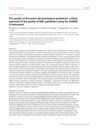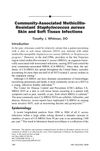 19 citations,
November 2011
19 citations,
November 2011 Using systemic drugs as creams for skin conditions shows promise, but more research is needed to confirm their effectiveness and safety.
 19 citations,
September 2004 in “Reviews in gynaecological practice”
19 citations,
September 2004 in “Reviews in gynaecological practice” Effective hirsutism management requires identifying the cause, combining new and traditional treatments, and setting realistic expectations for patients.
 18 citations,
February 2022 in “Cell Death Discovery”
18 citations,
February 2022 in “Cell Death Discovery” ECM1-modified stem cells can effectively treat liver cirrhosis.
[object Object]  18 citations,
August 2019 in “Journal of Cosmetic Dermatology”
18 citations,
August 2019 in “Journal of Cosmetic Dermatology” PRP therapy may increase hair density in pattern hair loss without serious side effects, but more research is needed.
 18 citations,
December 2018 in “Expert Opinion on Biological Therapy”
18 citations,
December 2018 in “Expert Opinion on Biological Therapy” Hair follicle stem cells are promising for wound healing but require more research for safe clinical use.
 18 citations,
August 2018 in “Facial Plastic Surgery Clinics of North America”
18 citations,
August 2018 in “Facial Plastic Surgery Clinics of North America” Lasers, microneedling, and PRP improve skin rejuvenation and repair, with PRP enhancing the effects when combined with other treatments.
 18 citations,
June 2018 in “Journal of The American Academy of Dermatology”
18 citations,
June 2018 in “Journal of The American Academy of Dermatology” Fat tissue treatments may help with wound healing and hair growth, but more research with larger groups is needed to be sure.
 18 citations,
March 2018 in “Archives of Plastic Surgery”
18 citations,
March 2018 in “Archives of Plastic Surgery” The superficial temporal artery flap is a reliable method for reconstructing complex facial defects with minimal complications.
 18 citations,
January 2018 in “International journal of medical sciences”
18 citations,
January 2018 in “International journal of medical sciences” Non-thermal plasma treatment makes mouse skin thicker and increases growth factors without harming the tissue.
 18 citations,
September 2017 in “Clinics in Dermatology”
18 citations,
September 2017 in “Clinics in Dermatology” Obesity is linked to various skin disorders, which can help with early diagnosis and prevention of long-term health issues.
[object Object]  18 citations,
November 2016 in “Journal of Oral and Maxillofacial Surgery”
18 citations,
November 2016 in “Journal of Oral and Maxillofacial Surgery” Platelet-Rich Plasma (PRP) treatment can potentially increase hair density and quality in people with hair loss, but more research is needed to confirm its effectiveness.
 18 citations,
May 2016 in “Annals of Medicine”
18 citations,
May 2016 in “Annals of Medicine” The article concludes that correctly diagnosing systemic causes of hair loss requires a detailed clinical evaluation and a systematic diagnostic approach.
 18 citations,
October 2015 in “Journal of the European Academy of Dermatology and Venereology”
18 citations,
October 2015 in “Journal of the European Academy of Dermatology and Venereology” European dermatological guidelines vary in quality, with some highly rated, but improvements are needed in applicability and consistency.
 18 citations,
September 2015 in “Clinical Endocrinology”
18 citations,
September 2015 in “Clinical Endocrinology” Women with PCOS have higher levels of a certain growth factor, which can be reduced by taking metformin.
 18 citations,
November 2008 in “Disease-a-Month”
18 citations,
November 2008 in “Disease-a-Month” A common cause of skin infections in the U.S. is a strain of bacteria resistant to certain antibiotics, and prevention focuses on cleanliness and avoiding close contact.
 18 citations,
November 2007 in “Annals of Surgery”
18 citations,
November 2007 in “Annals of Surgery” Finasteride reduces inflammation and improves immune response after trauma by altering hormone levels.
 18 citations,
October 2005 in “International Journal of Pharmaceutics”
18 citations,
October 2005 in “International Journal of Pharmaceutics” Adding a small amount of TPGS to minoxidil can help hair growth, but too much TPGS reduces this effect and increases minoxidil in the blood.
 18 citations,
June 1999 in “Statistical Methods in Medical Research”
18 citations,
June 1999 in “Statistical Methods in Medical Research” The document concludes that PK/PD modeling is important for determining the safe and effective dosages of drugs.
 18 citations,
December 1996 in “Seminars in Cutaneous Medicine and Surgery”
18 citations,
December 1996 in “Seminars in Cutaneous Medicine and Surgery” Chemotherapy and cytokine therapy can cause various skin reactions, including hair loss and hypersensitivity.
 18 citations,
May 1992 in “American Journal of Biological Anthropology”
18 citations,
May 1992 in “American Journal of Biological Anthropology” Higher androgen levels do not cause baldness in men.
 17 citations,
March 2021 in “Expert Opinion on Biological Therapy”
17 citations,
March 2021 in “Expert Opinion on Biological Therapy” Use PRP and ASC-BT for hair loss and wound healing, but more research needed.
 17 citations,
January 2021 in “Dermatology and Therapy”
17 citations,
January 2021 in “Dermatology and Therapy” Laser-assisted drug delivery has shown improved treatment outcomes for skin conditions and has potential to reduce side effects and treatment time.
 17 citations,
March 2016 in “Liver international”
17 citations,
March 2016 in “Liver international” Men with advanced liver disease and high oestrone and low testosterone levels have worse health outcomes.
![Comparative Oncology: Evaluation of 2-Deoxy-2-[18F]Fluoro-D-Glucose (FDG) Positron Emission Tomography/Computed Tomography (PET/CT) for the Staging of Dogs with Malignant Tumors](/images/research/d55cf8d9-d8ee-4735-9b38-42a266b4059d/small/24322.jpg) 17 citations,
June 2015 in “PLOS ONE”
17 citations,
June 2015 in “PLOS ONE” FDG PET/CT scans can change cancer treatment plans for dogs.
 17 citations,
January 2014 in “Journal of Clinical and Diagnostic Research”
17 citations,
January 2014 in “Journal of Clinical and Diagnostic Research” Patients with oral lichen planus or oral lichenoid reactions had worse cholesterol levels and a higher risk of obesity compared to healthy individuals.
 17 citations,
May 2013 in “Oral and Maxillofacial Surgery Clinics of North America”
17 citations,
May 2013 in “Oral and Maxillofacial Surgery Clinics of North America” The document concludes that careful surgical methods and choosing the right materials are key for successful scalp, skull, and frontal sinus reconstruction.
 17 citations,
January 2011 in “The Korean Journal of Hepatology”
17 citations,
January 2011 in “The Korean Journal of Hepatology” Vogt-Koyanagi-Harada disease can develop during interferon therapy for chronic hepatitis C.
 17 citations,
December 2009 in “Journal of Pediatric Orthopaedics”
17 citations,
December 2009 in “Journal of Pediatric Orthopaedics” Two babies needed surgery to remove hair tightly wrapped around their toes to prevent serious injury.
 17 citations,
August 2002 in “Dermatologic Surgery”
17 citations,
August 2002 in “Dermatologic Surgery” Fluridil safely promotes hair growth in men with androgenetic alopecia.
 17 citations,
January 1995 in “The American Journal of Medicine”
17 citations,
January 1995 in “The American Journal of Medicine” The document concludes that proper diagnosis and tailored long-term treatment can effectively manage androgenic disorders in women, improving patient care outcomes.
























![Comparative Oncology: Evaluation of 2-Deoxy-2-[18F]Fluoro-D-Glucose (FDG) Positron Emission Tomography/Computed Tomography (PET/CT) for the Staging of Dogs with Malignant Tumors](/images/research/d55cf8d9-d8ee-4735-9b38-42a266b4059d/small/24322.jpg)





